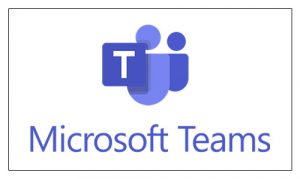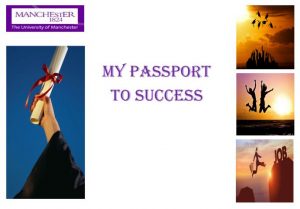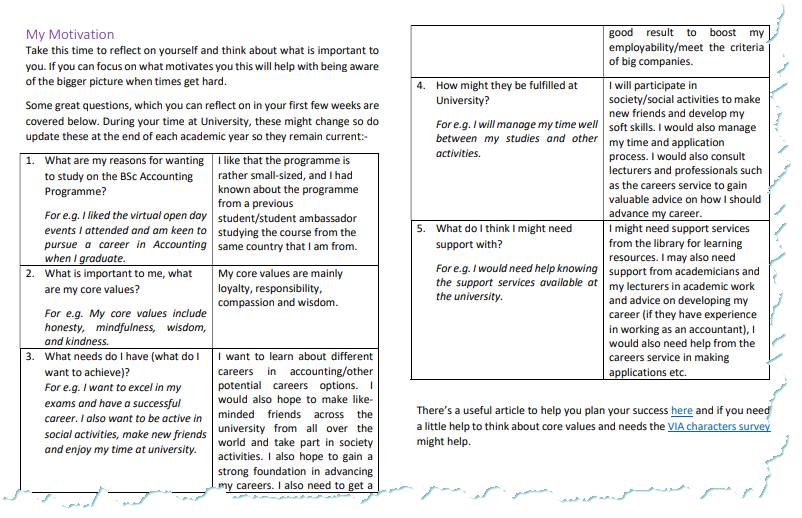My Passport to Success! – Empowering Students in Higher Education through Critical Self Reflection
Introduction
Given the strong emphasis on skills development to be employability ready (P. De Langeet al. 2006) and concerns around students’ well-being, this project seeks to promote an inclusive and cohesive approach in building self-directed learners through the academic advising process. It is also an innovative way to ensure that students come prepared for academic advising meetings and can track their own learning journey throughout their time at university.
Project background
As lockdown began, the Programme Director received feedback from students on the BSc Accounting Programme that they felt disconnected from their academic advisor and were in greater need of support. This was indicative of the challenges faced across the sector as in the Pearson/Wonkhe student expectations survey (July 2020) where students indicated that one of the main ways online learning could be improved was through academic support – more 1:1 time with tutors. However, the academic advisors were also struggling with extra workload demands placed on them.
Hear Reimi introduce her project in this video:
How we addressed the challenge
Considering the challenge of lack of time for academic advisors and increased need of support for students we started this project to improve the quality of academic advising meetings and to get students more engaged in autonomous learning.
We created an Academic Advising workbook for students called ‘My Passport to Success’ to encourage critical self-reflection and help students become independent learners with a growth mindset (Carol Dweck, 2008; Biggs and Tang, 2011). This workbook which guides students through the degree programme enables them to thrive by fully supporting their academic, well-being and employability needs.
 We used Microsoft Teams to deploy the passport initiative by creating separate Teams for each academic advisor with channels for each year group to host the passport documents which were password protected to safeguard privacy, within the shared collaboration space. We built a sense of belonging (Wenger, 1998) for each advisee group to encourage collaboration and sharing of useful messages with their academic advisor.
We used Microsoft Teams to deploy the passport initiative by creating separate Teams for each academic advisor with channels for each year group to host the passport documents which were password protected to safeguard privacy, within the shared collaboration space. We built a sense of belonging (Wenger, 1998) for each advisee group to encourage collaboration and sharing of useful messages with their academic advisor.
We also used the chat functionality for ongoing interactions and video calls for 1:1 academic advising meetings which were time saving and easy to manage once scheduled. It was a more personalised and informal way to connect with academic advisors. The main benefit of using Teams was that it helped alleviate concerns around students’ mental well-being by providing direct access to advisees in a trusted space especially in a challenging academic climate. Teams also offered greater flexibility for timely responses with the Teams chat app on the mobile device (Quinn, 2011).
 Learner outcomes
Learner outcomes
We ran a survey at the program level with specific questions covering the passport initiative to gather feedback from students. A total of 36 students participated in the detailed survey with 15 being from Year 1, 13 from Year 2 and 8 from the Final Year. Based on the results, 53% of students completed their passports before their personal tutor meetings 22% after their personal tutor meetings and 25% did not complete it.
Below is a summary of the overall student’s learning experience collated as part of this survey.
Some of the positives highlighted by students include the following:
- Helps the advisor understand and help me
- Helpful in understanding learning and career needs
- Understand learning progress
- Good way to do feedback
- Make a clear plan to set goals for the year and reflect on areas to improve for the subsequent year of study with help from advisor to find solutions
- Gives deeper self-reflection and a clearer goal
- Helps reflect on past events but also future actions that can be taken
Some of the challenges highlighted by students include the following:
- It wasn’t a credit bearing exercise
- Felt pressurized not having the time to do it
- Difficult to think about future career without having any plan on how to achieve it
- Struggled with setting goals
- More open ended questions would have made reflections easier.
In terms of the outcomes for students we are looking to collect data on year end results to find out if there is a link between overall attainment, ability to secure internship opportunities and those who completed the passport.
Further Student Feedback
Based on a focus group feedback of 5 students (4 final year students and 1 second year student) who engaged with the passport, below are their testimonials:
The whole process is really worth it. At the start students won’t think so but will feel some sort of accomplishment by looking back at what they have done in the past and seeing what they have achieved. (Final year student)
Although it takes time, it is useful as I’m not a person who will practically reflect but because of the passport I have the chance to reflect on what I have done and what I can improve. (Final year student)
I felt the time I invested was worth it because I needed the time to make me think and it is a learning process which is difficult but we must go through it. (Final year student)
It was worth it as we need time to think about what we did and gives us own feedback. Worth spending time on it. (Final year student)
At the start it wasn’t that useful as it just felt like another task to do by filling out 8-9 pages but I did go back to it when I was filling out the ICAEW summer competition and got a few ideas from it and realised it was useful as I knew where to find the information. (Second year student)
Benefits
Advisors:
- Learn about your students background and motivation levels
- Have a continuous record of students’ academic performance, reflections and progress against goals in one document
- Use limited contact time for meaningful conversations and providing focused support
- Use the passport as basis for providing reference letters
Advisees:
- Become autonomous learners by taking control of learning needs and using available resources
- Identify learning gaps and areas for improvement through critical self reflection
- Identify realistic goals and measure progress against these goals
- Kick start and seek employment opportunities earlier in the process
Top Tips
- Motivate students by explaining the benefits others have experienced by engaging with the passport.
- Nudge students into completing the passport before meetings or even before they can book meetings to have more meaningful conversations with their advisor.
- Identify the purpose and a more structured approach to academic advising by ensuring the benefits of engaging in the learning process are communicated upfront to get buy in from both academic advisors and students for better use of contact time in formal meetings for enabling focused support.
References
Biggs, J & Tang, C. (2011) Teaching for Quality Learning at University, SRHE
Dweck, C.S, (2008) Mindset: The New Psychology of Success, Random House Digital, Inc.
P. De Langeet al./Accounting and Finance 46 (2006) 365–386
Pearson/Wonkhe Student Expectations Survey July 2020. Available at: https://wonkhe.com/wp-content/wonkhe-uploads/2020/07/Pearson-Wonkhe-student-expectations-survey-published-version.pdf
Quinn, C. N. (2011) The Mobile Academy: MLearning for Higher Education, John Wiley & Sons, Incorporated. [Online] Available at: https://onlinelibrary-wiley-com.manchester.idm.oclc.org/doi/full/10.1111/teth.12075
Wenger, E. (1998) Communities of Practice: Learning, Meaning and Identity, Cambridge University Press.




0 Comments